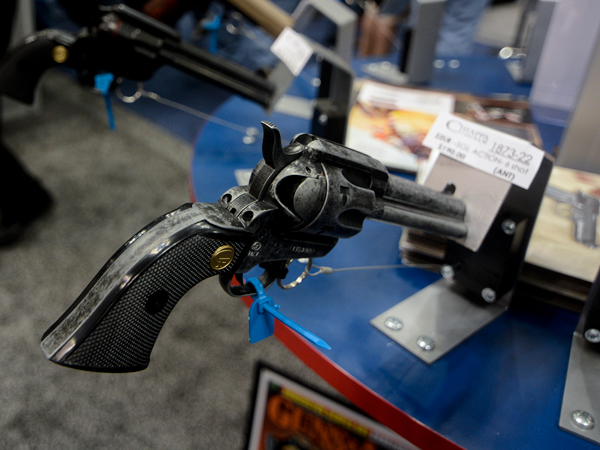PA Bill Number: HB2216
Title: In juvenile matters, providing for special immigrant juvenile status predicate orders.
Description: In juvenile matters, providing for special immigrant juvenile status predicate orders. ...
Last Action: Referred to Judiciary
Last Action Date: Feb 12, 2026
New impetus in gun debate, but where will it lead? :: 08/18/2014
First in a series - Twenty months after the mass shooting at Sandy Hook Elementary School in Newtown, Conn., some would say little has changed when it comes to guns in America.
Others would say everything has.
Flurries of gun-related legislation and renewed attention on the topic have not been enough to change federal gun laws. The National Rifle Association, still the most powerful entity in the war over guns in America, no longer has a monopoly on the debate.
A resurgence of the gun-control movement is challenging the status quo, and groups to the right of the NRA are also growing. Nonprofit organizations on each side are battling as they haven't in years, all trying to shape the country's politics and win over the American people.
But in spite of the evolving landscape, no progress in either direction is certain.
The gun-control movement was nearly $285 million behind the gun-rights movement in 2012 revenue raised before Sandy Hook. Today, it is playing catch-up to the money, membership, and political savvy of its opponents as the NRA works to maintain its dominance.
Over this year, News21 reporters, videographers, and photojournalists traveled across the country to assess the state of the gun debate, its evolution, and emerging issues.
'Formidable force'
With new groups, a revamped strategy, more money, and unprecedented collaboration, the gun-control movement has made headway. Organizations like Everytown for Gun Safety, the group backed by former New York City Mayor Michael Bloomberg, say they are moving the needle.
"Now, for the first time in our country's history, there is a well-financed and formidable force positioned to take on the Washington gun lobby," Shannon Watts, founder of the gun-control group Moms Demand Action for Gun Sense in America, said at an Everytown event on Capitol Hill in May.
Whether that is possible remains to be seen.
The NRA is strong financially. Its budget has consistently hovered well above $200 million in revenue in recent years and it has cultivated a highly organized grassroots base for more than a century.
As the gun-control movement organized after Sandy Hook, the gun-rights movement's membership boomed. Groups more conservative than the NRA, like the National Association for Gun Rights, are growing. State legislatures across the country passed laws expanding gun rights.
The NRA frequently targets Bloomberg, who in April donated $50 million to Everytown, though the amount is a quarter of what the NRA raises each year.
With its near-mythical presence as a political lobby, the NRA is still by far the best-positioned player in the debate.
An amendment expanding background checks went to a vote in the Senate in 2013, which gun-control advocates saw as a victory. It didn't get enough votes to pass.
The NRA began as a firearms education organization and sportsmen's club in 1871 and didn't get involved in politics until the 1970s. Today, the NRA says it has five million members.
Around the same time the NRA entered politics, the group that became the Brady Campaign to Prevent Gun Violence was founded [editors note: this article conveniently leaves out the original name - Handgun Conrol Inc.]. It attained a high profile after the 1981 assassination attempt on President Ronald Reagan, in which Reagan press secretary James Brady was shot and partially paralyzed.
Its advocacy work in the '80s and '90s culminated in passage of the Brady Act - which required federal background checks on people buying firearms - and the now-expired assault-weapons ban, both signed by President Bill Clinton in 1994.
In 1999, the Columbine High School shooting led to a resurgence of gun-control advocacy. After a handful of state legislative victories, the movement fizzled.
That was the landscape when a spate of prominent mass shootings began: Virginia Tech in 2007; Tucson, Ariz., in 2011, in which then-Rep. Gabrielle Giffords (D., Ariz.) was wounded; the Aurora, Colo., theater shooting in 2012; and then Newtown.
http://www.philly.com/philly/news/politics/20140818_New_impetus_in_gun_debate__but_where_will_it_lead_.html#c0FHwyzCbHVICk9B.99
http://www.philly.com/philly/hp/news_update/271618121.html
About This Series
Across the country, calls rise for action on guns, either for tighter restrictions or for stronger rights for gun owners.
This report is part of the project Gun Wars: The Struggle Over Rights and Regulation in America, produced by the Carnegie-Knight News21 initiative, an investigative-reporting project involving top college students across the country and based at the Walter Cronkite School of Journalism and Mass Communication at Arizona State University. See the complete project at http://gunwars.news21.com



